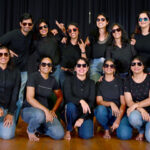
It’s festival season in India! It’s natural to wonder what the Montessori stance on festivals is. Did Montessori believe in celebrations? Does Anthea?
Since Montessori developed the pedagogy in Italy in the early 1900’s, the question of festivals and rituals probably didn’t arise as much as it does in today’s connected world. However, the Montessori system is inherently adaptable – she believed that the purpose of education was to help the child adapt to the time and culture into which they were born. If festivals are a big part of our culture – then, absolutely, the child must be introduced to them!
 While Montessori recommended reserving discussions on morality or religion for the second plane child (ages 6-12), festivals can easily be shared with younger children too. There is the practical work of cleaning the house in preparation for rituals. There is the sensory joy of preparing food unique to each festival. Throw in specific vocabulary related to each festival for an engaging lesson in language. And above all, there is the cultural learning that while each festival is unique, the joy emanating from celebrating them unites us all, whatever our region, caste or religion.
While Montessori recommended reserving discussions on morality or religion for the second plane child (ages 6-12), festivals can easily be shared with younger children too. There is the practical work of cleaning the house in preparation for rituals. There is the sensory joy of preparing food unique to each festival. Throw in specific vocabulary related to each festival for an engaging lesson in language. And above all, there is the cultural learning that while each festival is unique, the joy emanating from celebrating them unites us all, whatever our region, caste or religion.Montessori’s ‘education for life’ is based on harmony and co-existence. What better way to drive home the point than by celebrating as many festivals as possible, and learning about the diversity of people around us? Older children may soon begin to realize common patterns between festivals celebrated around the world – harvest festivals, for instance, or those that celebrate the coming of spring. We hope that this leads them to studies of history and geography, as they understand why people in different places observe the festivals that they do.
It is important to note that celebrating every single festival each year may be overwhelming, especially in a country that has so many. At Anthea, we earmark a diverse group of 5-6 festivals to celebrate annually. In the past, we’ve had parents share their Navroz, Bonalu and Eid traditions with the children. We’re always happy to hear from you, if you’d like to celebrate rituals unique to your culture!







No comment yet, add your voice below!